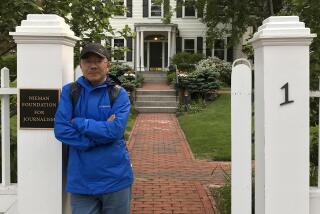China arrests a signer of a freedom charter
- Share via
BEIJING — China has arrested at least one prominent dissident and has questioned and possibly detained others who were among more than 300 signatories to a declaration demanding more freedoms.
Liu Xiaobo, a prolific literary critic who spent 20 months in prison for joining students in the 1989 Tiananmen Square protests, was arrested Monday night at his home in Beijing. Human rights organizations said the 53-year-old Liu was being detained on suspicion of “inciting subversion of state power,” a charge often used against government critics.
“There were more than a dozen police,” said his wife, Liu Xia, in a telephone conversation that was repeatedly cut off. “I am very frightened. Nobody can get in touch with him.”
The arrest came in the run-up to today’s 60th anniversary of the United Nations’ adoption of the Universal Declaration of Human Rights, a landmark document credited with inspiring the modern human rights movement.
The Chinese activists are using the anniversary as a peg to release what they are calling “Charter 08,” a petition with recommendations for constitutional reforms that would make the ruling Communist Party more accountable.
Among the more than 300 people who have signed the document so far are academics, writers, lawyers, businesspeople and former party officials.
It is modeled on the Soviet-era Charter 77 signed by dissidents in what was then Czechoslovakia.
“We signed it because we are eager to express our opinions about democracy, freedom and rule by constitution,” said Li Datong, former editor of a weekly supplement of the China Youth Daily.
At least one other signatory was detained and later released. Zhang Zhuhua said his computer, books and documents were confiscated and that he was interrogated for 12 hours. It was unclear whether others had been detained because the phones of many of them had been cut off.
In a published interview timed for the U.N. anniversary, Wang Chen, director of the State Council Information Office, said that “China has made historic progress in human rights,” but he acknowledged that social inequality remained a problem.
More to Read
Sign up for Essential California
The most important California stories and recommendations in your inbox every morning.
You may occasionally receive promotional content from the Los Angeles Times.










